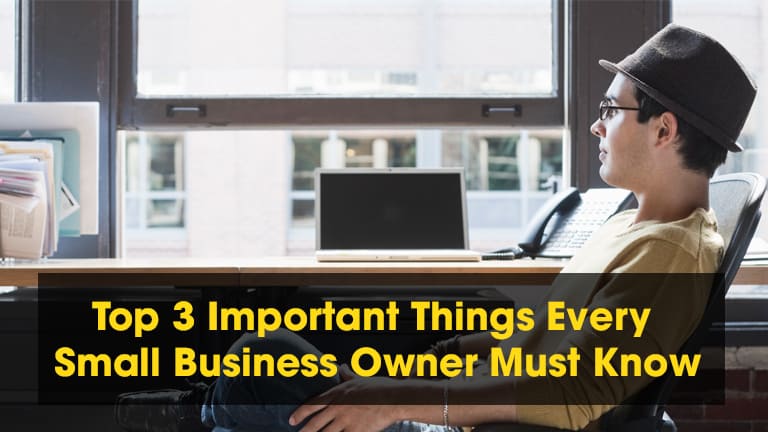If you’ve been a small business owner for several years, working diligently as your business grows, you may have added employees to keep up with the workload. You might ask, “Is this the ideal direction for my business?” Perhaps you had a very different vision when you started your business, but have lost sight of it. This is common when owners get caught up working “in” their business, and the focus becomes unclear.
Don’t feel alone. Entrepreneurs usually start out having a long-term goal and a strong passion, but somewhere within the many layers of running a business, the original goal may have been diluted or forgotten, and the results feel nothing more than average. In this article, I will point out three top priorities for small business owners to consider in order to maximize their efforts.
Here are 3 critical areas to work on:
- Build more assets and minimize liabilities.
- Know how to make your assets work for you.
- Make gains in self-improvement and knowledge, always revisiting your assumptions.
Let’s discuss these three capacities in more detail:
First, let me share with you a true story I learned not long ago. Since one of my relatives works in the medical field in the end-of-life cancer care department, she shares many sad stories that have shaped my perspective as a small business owner. Of all the stories she has told me, the one I remember most was the story of a gentleman who ran a small successful construction business and was the breadwinner for his family. When discovering the severity of his cancer, he had less than six months to live, and everything he was building seemed to come crashing down. Why? Because he knew that without him, his business couldn’t operate. Family members he left behind couldn’t inherit what he had built, beyond his life insurance policy, if he had one.
All the knowledge he had gained over the years which made him a great contractor was about to go down with him. As a fellow entrepreneur, I felt very sorry for him—and his family. While reflecting on this story and what to do as a small business owner, I was inspired to write this article. As small business owners, we can remind ourselves to build the kind of business that will grow our assets over time, while reducing our liabilities, rather than focusing solely on daily operations.
We can ask ourselves this hard question: “What assets can my family inherit if I get hit by a bus someday?” I know this is a sensitive question that no one wants to think about, but if you are an experienced business owner you would know that bad things can arise when least expected. Whatever transpires in your business, you should think of a way to turn it into an asset which you and your loved ones can use.
For example, if you run a small auto service business and your children want to take over the family business someday, start to transfer your knowledge and trade secrets to them—sooner, rather than later. If none of them are interested in the business and prefer to do something else, then you can write a book, eBook or a blog sharing what you have learned from your years of experience. If you can’t write well, outline what you think is valuable knowledge and hire a ghostwriter to help you accomplish it. Many small business owners do not realize the true value of their knowledge, accrued over the years. It’s truly an asset when compiled into a well-organized document. It’s your digital real estate, and content marketers would know exactly what this means.
If you are a real estate agent or business consultant, you can do the same to build your assets or you might have additional ideas that will build assets for you. No matter what industry you are in, if you think hard, you will find a way to turn your knowledge and experience into an asset for you and your family—starting today.
About the liabilities—you can learn to minimize liabilities over time as any clever business owner would do. To clearly understand the differences between liabilities and assets, let me clarify them. A liability is an investment that takes money out of your pocket each month (because of a negative end-of-month balance) and an asset is an investment that puts more money into your pocket each month (a positive balance). Understanding them clearly, you can now consider which things you can focus on to minimize your liabilities, and which things you should work on to build your assets.
Second, when you have an asset, you need to make it work for you, ideally (almost) on auto-pilot. Because that’s the best way for you and your family to benefit from them over the long term. If you are a real estate investor, I think you already know what I mean by building assets that pay out for a long time. However, if you are a professional working for a corporation, you might want to figure out a way to document, package and promote your knowledge and experience in a way that other people will consume it. The logical exception in this example is the information which cannot be shared outside the company, such as trade secrets and confidential or proprietary information.
If you are an insurance agent with years of experience in the industry, why not create a blog site where you share best practices and other content that would benefit people for free, while running Google AdSense or affiliate programs to generate extra revenue? If possible, try to create predominantly “evergreen” content that will remain relevant for years to come.
Key takeaway: A smart person works for a good company to gain income for each day of work. A wise person invests time producing something once that will continue to gain income and/or benefits for years to come. This is the ultimate cornerstone of how to make your assets work for you.
Third, sometimes success can be your own worst enemy. Why? Because it feeds your ego so that sometimes you are unwilling to listen to other people’s great ideas and advice. Therefore, no matter how many successes or failures you encounter, you should always be open to advice and continue to improve yourself with books written by people who “walk the talk.”
Sometimes people view successful, rich people like a walking-talking-money-printing machine, which does have some truth to it. Since money is a currency, and, like an electrical current, it will not produce benefits if it stays in one place. It must move or exchange hands to yield the most benefit. In business, we must all continually elevate our knowledge and keep up with new technologies and concepts. Without it, we can’t continue to bring benefits to the business. So, keep on learning and revisit your assumptions often to make necessary adjustments to keep your business on track.
After many years of running a small business with employees on the payroll, these are the three things I would consider THE most important on my list as an entrepreneur. I hope this article provides you with another perspective for assessing your business and considering additional opportunities. If you think this article will benefit other self-employed individuals like us, please share it with them. You might also have a great conversation considering these points and what they could mean to you and your businesses. Thank you!







